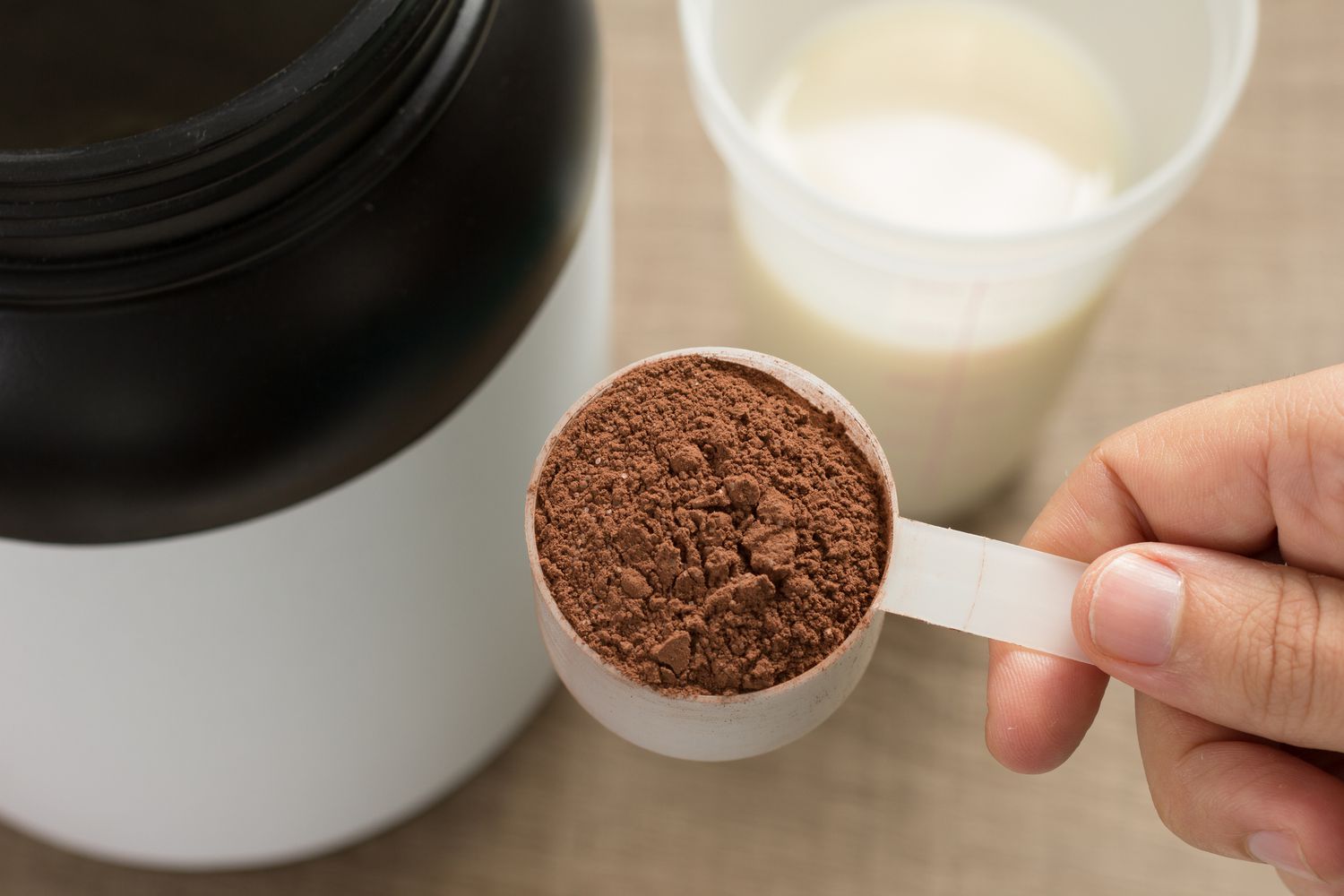Introduction

Brief Overview of Casein Protein: Casein protein is a slow-digesting dairy protein derived from milk. It constitutes about 80% of the total protein content in cow’s milk and is known for its ability to form a gel-like substance in the stomach, which allows for a slow and steady release of amino acids into the bloodstream. This unique characteristic makes casein an ideal protein source for prolonged muscle protein synthesis, particularly beneficial for periods of fasting, such as overnight.(WebMD).
Importance of Protein in the Diet: Protein is an essential macronutrient crucial for various bodily functions. It plays a vital role in building and repairing tissues, producing enzymes and hormones, and supporting immune function. Adequate protein intake is necessary for maintaining muscle mass, especially as we age. Proteins are made up of amino acids, some of which are essential and must be obtained through diet.
Purpose of the Article: This article aims to provide an in-depth understanding of casein protein, its benefits, and how it compares to other protein sources. By exploring its nutritional profile, health benefits, potential side effects, and practical uses, readers will be equipped with the knowledge to make informed decisions about incorporating casein protein into their diets. Whether you are an athlete looking to enhance muscle recovery or someone interested in general health and wellness, this article will guide you through everything you need to know about casein protein.
What is Casein Protein?

Definition and Source of Casein Protein: Casein protein is a slow-digesting protein found in milk, making up about 80% of the protein content in cow’s milk. It is extracted during the cheese-making process, where the milk is coagulated, and the casein is separated from the whey. The resulting casein protein can then be dried and processed into a powder form for use in various dietary supplements.
The slow-digesting nature of casein is due to its unique structure. When ingested, casein forms a gel or clot in the stomach, slowing the release of amino acids into the bloodstream. This makes it an excellent source of protein for providing a sustained release of nutrients over several hours, which is particularly beneficial for muscle recovery and growth during periods of fasting, such as overnight. Learn the difference between casein protein and whey protein here.
Types of Casein Protein:
- Micellar Casein:
- Definition: This is the most natural form of casein protein, obtained through ultrafiltration of milk. It retains its micelle structure, which is responsible for its slow digestion and absorption.
- Benefits: Ideal for providing a steady supply of amino acids over a prolonged period, making it suitable for consumption before bedtime or between meals.
- Source: Found in high-quality casein protein powders and supplements.
- Casein Hydrolysate:
- Definition: This form of casein protein is pre-digested through a process called hydrolysis, which breaks down the protein into smaller peptides.
- Benefits: Faster absorption compared to micellar casein, making it useful for those who need a quick source of protein without the extended digestion time.
- Source: Often used in clinical nutrition and some specialized sports supplements.
- Calcium Caseinate:
- Definition: This form is produced by adding calcium to casein, resulting in a more soluble protein.
- Benefits: Easily mixed with liquids and has a faster digestion rate than micellar casein, though still slower than whey protein.
- Source: Commonly found in protein shakes and meal replacement products.
Nutritional Profile of Casein Protein
Macronutrient Composition: Casein protein is known for its high protein content and favorable macronutrient profile, making it a popular choice for those looking to increase their protein intake. A typical serving of casein protein powder (about 30 grams) provides approximately:
- Calories: 110-120 kcal
- Protein: 24-26 grams
- Carbohydrates: 1-3 grams
- Fat: 0.5-1 gram
This composition can vary slightly depending on the brand and specific product, but generally, casein protein is low in fat and carbohydrates, making it an excellent source of lean protein. The high protein content and low carbohydrate and fat levels make it suitable for muscle building and weight management.
Amino Acid Profile: Casein protein is rich in essential amino acids, which are crucial for muscle repair, growth, and overall health. It contains all nine essential amino acids that the body cannot produce on its own. Some key amino acids found in casein protein include:
- Leucine: Important for muscle protein synthesis.
- Isoleucine: Supports muscle recovery and energy production.
- Valine: Aids in muscle repair and growth.
- Glutamine: Supports immune function and gut health.
- Lysine: Essential for collagen production and immune function.
The complete amino acid profile of casein protein makes it a high-quality protein source, similar to other animal-based proteins like whey.
Comparison with Other Proteins:
- Whey Protein:
- Digestion and Absorption: Whey protein is rapidly digested and absorbed, making it ideal for post-workout recovery.
- Protein Content: Whey protein also has a high protein content, similar to casein.
- Amino Acids: Both whey and casein contain all essential amino acids, but whey has a higher concentration of leucine, which is beneficial for muscle synthesis.
- Soy Protein:
- Plant-Based Option: Soy protein is a complete plant-based protein, making it suitable for vegetarians and vegans.
- Digestion and Absorption: It has a moderate digestion rate, faster than casein but slower than whey.
- Nutrient Content: Soy protein also provides essential amino acids but has lower levels of certain amino acids like methionine.
- Pea Protein:
- Plant-Based and Hypoallergenic: Pea protein is another plant-based protein that is hypoallergenic and suitable for those with dairy or soy allergies.
- Amino Acid Profile: It is rich in essential amino acids but lacks sufficient methionine.
- Digestion and Absorption: Pea protein is digested and absorbed at a moderate rate, similar to soy protein.
Health Benefits of Casein Protein

Muscle Growth and Repair: Casein protein is highly effective in promoting muscle growth and repair, particularly due to its slow digestion and sustained release of amino acids. This makes it an ideal protein source for periods when the body goes without food, such as overnight. Consuming casein protein before bedtime can help maintain a positive protein balance and enhance muscle recovery during sleep. Studies have shown that casein can significantly increase muscle protein synthesis and reduce muscle breakdown, making it a valuable supplement for athletes and bodybuilders.
Weight Management and Satiety: Casein protein can be an effective tool for weight management due to its ability to promote satiety. The slow-digesting nature of casein helps to keep you feeling full for longer periods, reducing overall calorie intake. This can be particularly beneficial for those looking to lose weight or maintain a healthy weight. Additionally, consuming protein-rich foods can boost metabolism and aid in preserving lean muscle mass during weight loss.
Bone Health: Casein protein contains several bioactive peptides that have been shown to have positive effects on bone health. These peptides can enhance calcium absorption and promote bone mineral density, which is crucial for maintaining strong and healthy bones. Furthermore, the high calcium content in casein protein itself contributes to meeting the body’s daily calcium needs, supporting overall bone health and reducing the risk of osteoporosis.
Immune Support: Casein protein also offers immune support through its rich supply of amino acids and bioactive peptides. These components can enhance the body’s natural defense mechanisms, promote the growth of beneficial gut bacteria, and support the production of antibodies. Additionally, some peptides derived from casein have antimicrobial properties, which can help in protecting against infections and supporting overall immune function.
Uses of Casein Protein

In Sports Nutrition and Bodybuilding: Casein protein is a staple in sports nutrition and bodybuilding due to its unique properties. Its slow-digesting nature provides a steady release of amino acids, making it particularly beneficial for muscle maintenance and growth during long periods without food, such as overnight. Athletes and bodybuilders often consume casein protein before bedtime to ensure their muscles receive a continuous supply of nutrients, promoting recovery and preventing muscle breakdown. Additionally, casein protein can be used in combination with whey protein to maximize muscle protein synthesis both immediately after workouts and during extended recovery periods (Verywell Health).
For General Health and Wellness: Casein protein is not just for athletes; it also offers several benefits for general health and wellness. Its ability to provide sustained satiety can help with weight management by reducing hunger and overall calorie intake. Moreover, the high-quality amino acids in casein support various bodily functions, including muscle repair, immune function, and bone health. Incorporating casein protein into a balanced diet can help ensure adequate protein intake, which is essential for maintaining muscle mass, especially as we age.
In Dietary Supplements and Meal Replacements: Casein protein is commonly found in dietary supplements and meal replacements due to its versatile nutritional profile. These products are designed to provide a convenient source of high-quality protein for individuals with busy lifestyles or specific dietary needs. Casein protein powders can be easily mixed into shakes, smoothies, and other beverages, making it simple to boost protein intake throughout the day. Additionally, meal replacement bars and ready-to-drink shakes often contain casein protein to help keep you full and satisfied between meals, aiding in weight management and overall nutrition.
Casein Protein vs. Whey Protein
Digestion and Absorption Rates:
- Casein Protein:
- Digestion: Casein protein is known for its slow digestion and absorption. When consumed, it forms a gel-like substance in the stomach, which slows down the release of amino acids into the bloodstream.
- Absorption Rate: The slow and steady absorption of amino acids from casein can last for several hours, providing a prolonged supply of nutrients to the muscles. This makes it ideal for periods when the body will be without food for an extended time, such as overnight.
- Whey Protein:
- Digestion: Whey protein is rapidly digested and absorbed. It is a fast-acting protein that quickly breaks down into amino acids and is absorbed into the bloodstream.
- Absorption Rate: The quick absorption of whey protein leads to a rapid spike in amino acid levels in the blood, making it ideal for immediate muscle recovery and repair, particularly after workouts.
Timing of Consumption (Pre-Sleep vs. Post-Workout):
- Casein Protein:
- Pre-Sleep: Due to its slow digestion and sustained release of amino acids, casein protein is best consumed before bedtime. This helps maintain a positive protein balance overnight, promoting muscle recovery and growth while preventing muscle breakdown during fasting periods.
- Other Times: Casein can also be consumed between meals to help with satiety and provide a steady supply of amino acids throughout the day.
- Whey Protein:
- Post-Workout: Whey protein is most effective when consumed immediately after workouts. The rapid digestion and absorption provide a quick supply of amino acids necessary for muscle repair and growth, making it ideal for post-exercise recovery.
- Other Times: Whey can be consumed at any time of the day when a quick protein boost is needed, such as in the morning or as a snack.
Benefits and Drawbacks of Each:
- Casein Protein:
- Benefits:
- Slow, sustained release of amino acids
- Ideal for muscle maintenance and growth during fasting periods (e.g., overnight)
- Promotes satiety, aiding in weight management
- Supports bone health with bioactive peptides
- Drawbacks:
- Not suitable for immediate post-workout recovery due to slow absorption
- May cause digestive issues for individuals with lactose intolerance or dairy allergies
- Benefits:
- Whey Protein:
- Benefits:
- Rapid digestion and absorption for quick muscle recovery
- High concentration of branched-chain amino acids (BCAAs), especially leucine, which is crucial for muscle protein synthesis
- Versatile and can be consumed at any time of the day
- Drawbacks:
- Short-lived amino acid supply, requiring more frequent consumption
- May cause digestive issues for individuals with lactose intolerance or dairy allergies
- Benefits:
Potential Side Effects and Considerations
Allergies and Intolerances:
- Allergies: Casein protein is derived from milk, which means it contains lactose and milk proteins that can cause allergic reactions in some individuals. Symptoms of a casein allergy can include hives, swelling, digestive distress, and in severe cases, anaphylaxis. Those with a known milk allergy should avoid casein protein and consider alternative protein sources such as soy or pea protein.
- Intolerances: Lactose intolerance, which is the inability to digest lactose, the sugar found in milk, can cause digestive issues such as bloating, gas, and diarrhea when consuming casein protein. However, some casein protein powders are processed to reduce lactose content, which may be better tolerated by individuals with lactose sensitivity.
Kidney Function Concerns: High protein intake, including from casein protein supplements, has been a topic of concern regarding kidney function. While consuming protein in amounts recommended for general health and fitness is generally safe for healthy individuals, those with pre-existing kidney conditions should exercise caution. Excessive protein intake can place additional strain on the kidneys, potentially exacerbating kidney issues.
For healthy individuals, moderate to high protein consumption has not been shown to cause kidney damage. It is essential to stay within recommended daily protein intake levels and consult with a healthcare provider if you have any concerns about your kidney health.
Recommended Dosages: The recommended dosage of casein protein varies based on individual needs, activity levels, and overall protein intake from other dietary sources. Here are some general guidelines:
- For Muscle Growth and Recovery: Consuming 20-40 grams of casein protein before bedtime can help support muscle protein synthesis and prevent muscle breakdown overnight.
- For General Health and Maintenance: Including 20-30 grams of casein protein as part of your daily protein intake can help meet overall protein needs, promote satiety, and support muscle maintenance.
How to Incorporate Casein Protein into Your Diet
Best Times to Consume Casein Protein:
- Pre-Sleep: Consuming casein protein before bedtime is highly beneficial due to its slow digestion and sustained release of amino acids. This can help maintain muscle protein synthesis and prevent muscle breakdown overnight. A typical dose is 20-40 grams of casein protein mixed with water or milk.
- Between Meals: Casein protein can also be consumed between meals to help with satiety and provide a steady supply of amino acids throughout the day. This can be particularly useful for those looking to manage their weight or maintain muscle mass.
- Post-Workout: While whey protein is typically preferred for post-workout recovery due to its rapid absorption, casein can still be effective if consumed in combination with whey or when a sustained release of protein is desired.
Examples of Casein-Rich Foods:
- Dairy Products:
- Milk: Both cow’s milk and goat’s milk are rich sources of casein protein.
- Cheese: Many types of cheese, especially cottage cheese, are high in casein.
- Yogurt: Particularly Greek yogurt, which is high in protein content, contains a significant amount of casein.
- Casein Supplements:
- Casein Protein Powder: Easily added to shakes, smoothies, or baked goods to increase protein intake.
- Casein Protein Bars: Convenient for on-the-go snacking, providing a high-protein option between meals.
Recipes and Meal Ideas:
Casein Protein Shake:
- 1 scoop casein protein powder
- 1 cup milk (or a non-dairy alternative)
- 1 banana
- 1 tablespoon almond butter
- Ice cubes
Blend all ingredients until smooth. Enjoy as a pre-sleep snack or between meals.
Overnight Oats with Casein Protein:
- 1/2 cup rolled oats
- 1 scoop casein protein powder
- 1 cup milk (or a non-dairy alternative)
- 1 tablespoon chia seeds
- 1/2 teaspoon vanilla extract
- Fresh berries or nuts for topping
Mix oats, casein protein powder, milk, chia seeds, and vanilla extract in a jar. Stir well, cover, and refrigerate overnight. In the morning, top with fresh berries or nuts and enjoy.
Casein Protein Pancakes:
- 1/2 cup oats
- 1 scoop casein protein powder
- 1 banana
- 2 eggs
- 1/4 cup milk (or a non-dairy alternative)
- 1/2 teaspoon baking powder
Blend oats until they become a flour-like consistency. Add casein protein powder, banana, eggs, milk, and baking powder to the blender and blend until smooth. Cook on a non-stick skillet over medium heat, flipping once bubbles form on the surface. Serve with fresh fruit or a dollop of Greek yogurt.
Casein Protein Pudding:
- 1 scoop casein protein powder
- 1/2 cup Greek yogurt
- 1/4 cup milk (or a non-dairy alternative)
- 1 tablespoon cocoa powder
- Sweetener of choice (honey, stevia, etc.)
Mix all ingredients in a bowl until well combined. Refrigerate for at least 30 minutes to allow the pudding to set. Enjoy as a high-protein dessert or snack.
Choosing the Right Casein Protein Supplement
Factors to Consider:
- Purity:
- Ingredients: Look for supplements with minimal ingredients. High-quality casein protein powders should primarily contain micellar casein or casein hydrolysate, with few additional ingredients.
- Testing and Certification: Choose products that are third-party tested for purity and quality. Certifications from organizations like NSF International or Informed-Sport can ensure the supplement is free from contaminants and accurately labeled.
- Additives:
- Artificial Sweeteners and Flavors: Be mindful of supplements with excessive artificial sweeteners, flavors, or colors. These additives can sometimes cause digestive issues or other adverse effects.
- Thickeners and Fillers: Avoid products with unnecessary thickeners or fillers, which can dilute the protein content and add unwanted substances to your diet.
- Brand Reputation:
- Research: Choose reputable brands known for their quality and transparency. Look for brands with positive reviews and a history of producing high-quality supplements.
- Customer Feedback: Read customer reviews to gauge the effectiveness and taste of the product. Brands with consistently positive feedback are more likely to provide a reliable product.
Reading and Understanding Labels:
- Protein Content:
- Serving Size: Check the serving size to understand how much protein you are getting per scoop or serving. A good casein protein supplement should provide at least 20-25 grams of protein per serving.
- Protein Source: Ensure that the primary protein source listed is micellar casein or casein hydrolysate. These forms are of high quality and provide the benefits associated with casein protein.
- Macronutrients:
- Carbohydrates and Sugars: Look at the carbohydrate and sugar content. Ideally, a good casein protein supplement should be low in sugars and unnecessary carbohydrates, making it suitable for a variety of dietary goals.
- Fat Content: Check the fat content to ensure it aligns with your dietary needs. Most casein protein powders have low fat content.
- Ingredients List:
- Additives: Review the list of ingredients for any unwanted additives such as artificial sweeteners, flavors, or colors. Natural ingredients are preferable.
- Allergens: Check for any potential allergens, especially if you have specific dietary restrictions or allergies. Common allergens include soy, gluten, and lactose.
- Certifications and Quality Marks:
- Third-Party Testing: Look for labels indicating third-party testing, such as NSF Certified for Sport or Informed-Choice. These certifications ensure the product has been tested for purity and quality.
- Organic or Non-GMO: If these factors are important to you, check for organic or non-GMO certifications.
